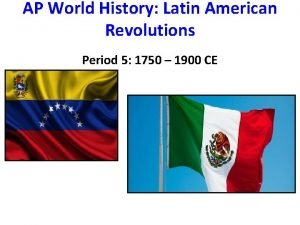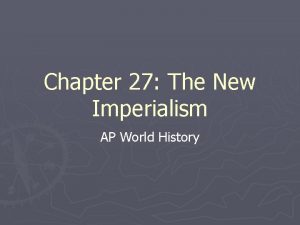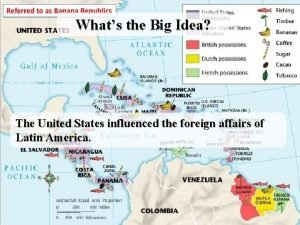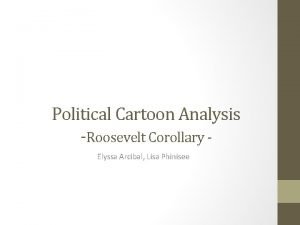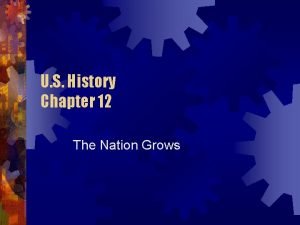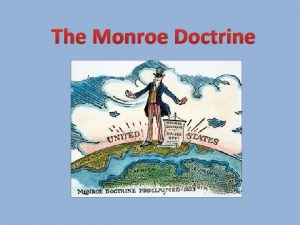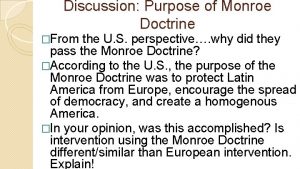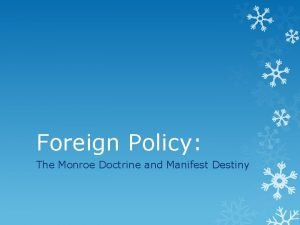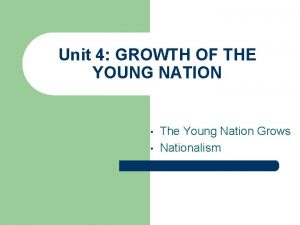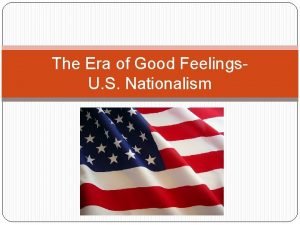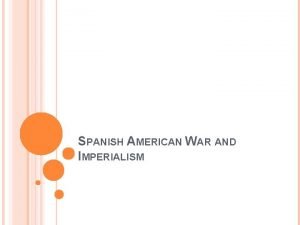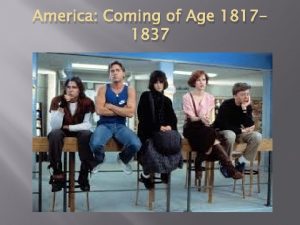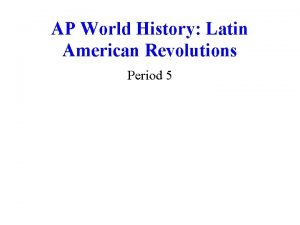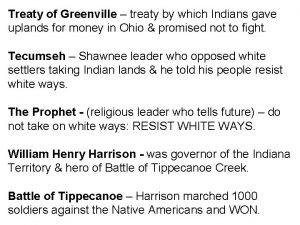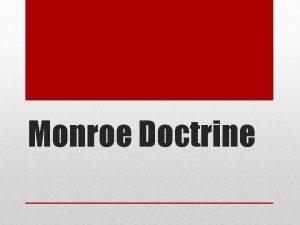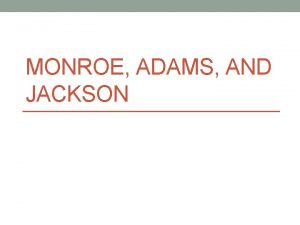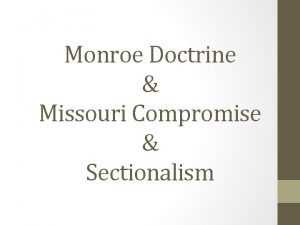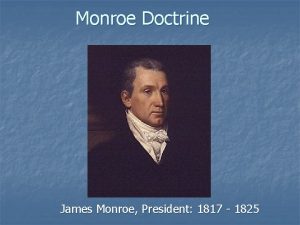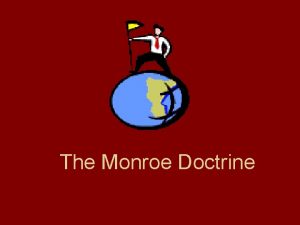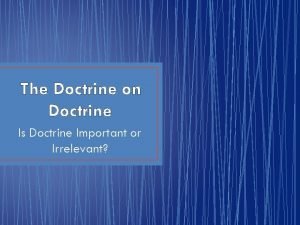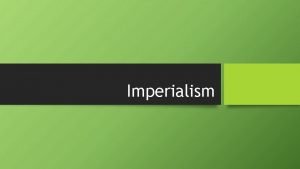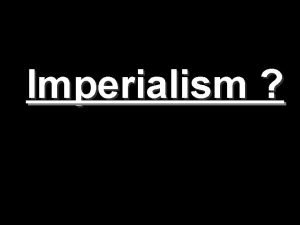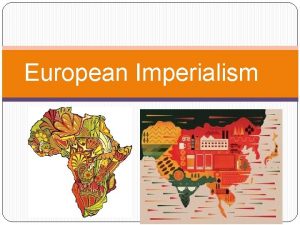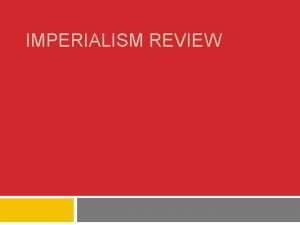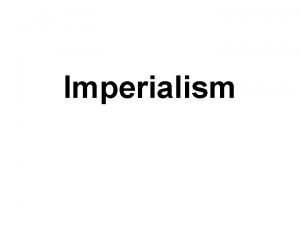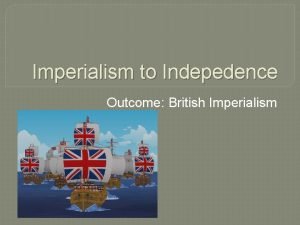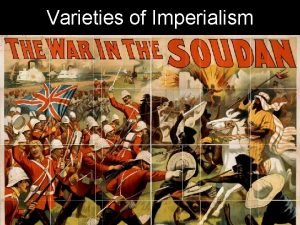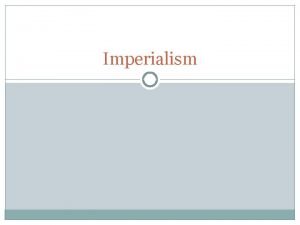Imperialism Monroe Doctrine The Monroe Doctrine was a



























- Slides: 27

Imperialism

Monroe Doctrine • The Monroe Doctrine was a US foreign policy regarding Latin American countries in 1823. It stated that further efforts by European nations to colonize land or interfere with states in North or South America would be viewed as acts of aggression, requiring U. S. intervention.

Imperialism • Imperialism is the rule of one country by another • The country was divided between Imperialist and Anti-Imperialist in the late 1800 s

Spanish American War • Origins of the Spanish American War • The Triggering Events • Course and Consequences of the War

Origins of the Spanish American War • Spain’s power was in decline. By 1898 Spain had Cuba, Philippines, Puerto Rico • Jose Marti organized rebellion while living in US

Humanitarian Concerns • Progressives move to reform internationally

Yellow Journalism • Technique for selling more newspaper by sensationalizing and even distorting news events to arouse interest and evoke sympathy • Joseph Pulitzer and William Randolf Hearst

Economic Interest • $50 million invested in Cuba • Cuban civil war was hurting investments and if America went to war and won that would open the door to more investments

Imperial interest • Ostend Manifesto-before Civil War letter that urged America to buy Cuba and turn it into a slave state/colony –remember Missouri Compromise

Triggering Events • De Lome Letter • Explosion of the Maine

Course and Consequence • War lasted four months • Theodore Roosevelt-Rough Riders took San Juan Hill outside of Santiago (old Cuban capital) • Commodore George Devey defeated Spanish fleet in Manila Bay the Philippines • Spain lost Cuba, Philippines, Puerto Rico and Guam • US paid $20 million for the Philippines, Cuba became independent but under direct control of the US

Teller Amendment-Platt Amendment • Anti-Imperialist in Congress passed the Teller Amendment along with declaring war • Stated the United States would not annex Cuba • After the war, Platt Amendment • US can intervene in Cuban affairs, put bases there and Cuba could not borrow from foreign countries that can later control them

Imperialist vs Anti Imperialist • The Spanish American War made the US an imperial power and people had different opinions about it Those in favor: Need for Raw materials and markets New technological Capabilities Importance of Naval Power (Alfred Thayer Mahan “The Influence of Sea Power Upon History) Competition with European Powers Golden Opportunity New Manifest Destiny White Man’s Burden- Anglo-Saxons Social Darwinists

• Against: • Immoral and against democracy • Lead to rivalry and armed conflict • Take jobs and reduce wages for Americans • Social reformers: Samuel Gompers (labor), Jane Addams (settlement houses), William Jennings Bryan (farmers) made the Anti Imperialist League • Mark Twain “I am opposed to having the eagle put its talons on any other land”

Our Colonial Empire after the war Philippines were upset the President Mc. Kinley annexed the Philippines instead of granting them their independence Begin fighting new American occupiers for 3 years Filipino forces defeated in 1902

Hawaii • Many American businesses (plantations) forced King of Hawaii to change constitution to give only property owners right to vote • 1893 Queen Liliuokalani tried to change constitution back but US Marines and landowners forced her out of power • President Cleveland refused to take Hawaii (anti-imperialist) • 1898 after war Congress voted to annex Hawaii

Guam Samoa and Midway • Midway 1867 • Guam taken from Spain • Samoa 1899 • Small islands provided supplies and fuel to ships

Pan Americanism • The idea that Latin America and US should work togoether

Puerto Rico, Cuba, Virgin Islands • Puerto Rico became and American possession • Cuba- Teller/Platt Amendment= protectorate • Virgin Islands- purchased from Dutch 1917

Foreign Policy 1898 -1914 • With the control of the Philippines and naval bases and coaling stations in Midway, Hawaii, Guam, Samoa, Asian importance grew

Open Door Policy in China 1899 • Secretary of State John Hay proposed equal trading rights for all foreign “Open Door” policy • Led to Boxer Rebellion-Chinese opposed to foreign influence • To compromise Hay announced US would oppose any attempt to divide China

Japan • Matthew Perry “gunboat diplomacy” opened Japan to trade • Japan became industrializing and desire to be imperialistic after what happened to them • Weak China and strengthening Japan led to war-Sino-Chinese War • Japan won and gained Taiwan and Korea • Later fought Russia for Chinese land won, Theodore Roosevelt ended the way with the Treaty of Portsmouth

Panama Canal • New Asian interest led to a need for the Panama Canal • Panama was part of Colombia and US offered $10 million and annual fee for the canal land. Colombia refused. US supported rebels in Panama who were trying to separate from Colombia. • Roosevelt sent ship to defend rebels, Panama became its own country and gave US “Panama Canal Zone” • Canal cost over $400 million and cost thousands of lives from work conditions and disease (malaria and yellow fever

Roosevelt Corollary • Monroe Doctrine- no new colonies in Americas • Roosevelt Corollary-no use of force to collect any debts in Americas • Dominican Republic • Haiti • “Big Stick” policy

Taft “Dollar Diplomacy” • Encouraged bankers to lend money to Caribbean countries to pay European loans or invest • When unable to pay US sent troops and government had to give control of certain industries to American businesses

Wilson “Watchful Waiting” • Intervened in Haiti, Nicaragua, and DR • Purchased Virgin Islands from Denmark • In Mexico, General Huerta overthrew government. Wilson did not recognize government • Sent troops to prevent Germans from landing arms in Mexico, Huerta left power • Angered Mexicans, Pancho Villa murdered American workers in Mexico and crossed border and attacked American town in New Mexico • Wilson sent troops into Mexico for a year to search for Pancho Villa but never found him

Florida involvement • Ybor City- Cuban cigar making operation • Cuban immigrants gave Jose Marti money and support • Tampa became big base for Spanish American War • Henry Flagler built railroad to Key West to increase trade potential
 Latin american revolution definition ap world history
Latin american revolution definition ap world history Monroe doctrine cartoon meaning
Monroe doctrine cartoon meaning Whats monroe doctrine
Whats monroe doctrine Roosevelt corollary
Roosevelt corollary Monroe doctrine definition
Monroe doctrine definition How did the gibbons v ogden decision promote nationalism
How did the gibbons v ogden decision promote nationalism Monroe doctrine political cartoon meaning
Monroe doctrine political cartoon meaning Monroe doctrine questions
Monroe doctrine questions Monroe doctrine
Monroe doctrine Monroe doctrine and manifest destiny
Monroe doctrine and manifest destiny Election of 1824 map
Election of 1824 map Monroe doctrine
Monroe doctrine Jeopardy monroe doctrine
Jeopardy monroe doctrine Monroe doctrine
Monroe doctrine Jose de san martin ap world history
Jose de san martin ap world history Treaty of greenville
Treaty of greenville Which precedent was established by the supreme court
Which precedent was established by the supreme court Monroe doctrine
Monroe doctrine Causes of new imperialism
Causes of new imperialism Old vs new imperialism
Old vs new imperialism Chụp tư thế worms-breton
Chụp tư thế worms-breton ưu thế lai là gì
ưu thế lai là gì Tư thế ngồi viết
Tư thế ngồi viết Cái miệng nó xinh thế
Cái miệng nó xinh thế Các châu lục và đại dương trên thế giới
Các châu lục và đại dương trên thế giới Cách giải mật thư tọa độ
Cách giải mật thư tọa độ Bổ thể
Bổ thể Tư thế ngồi viết
Tư thế ngồi viết
